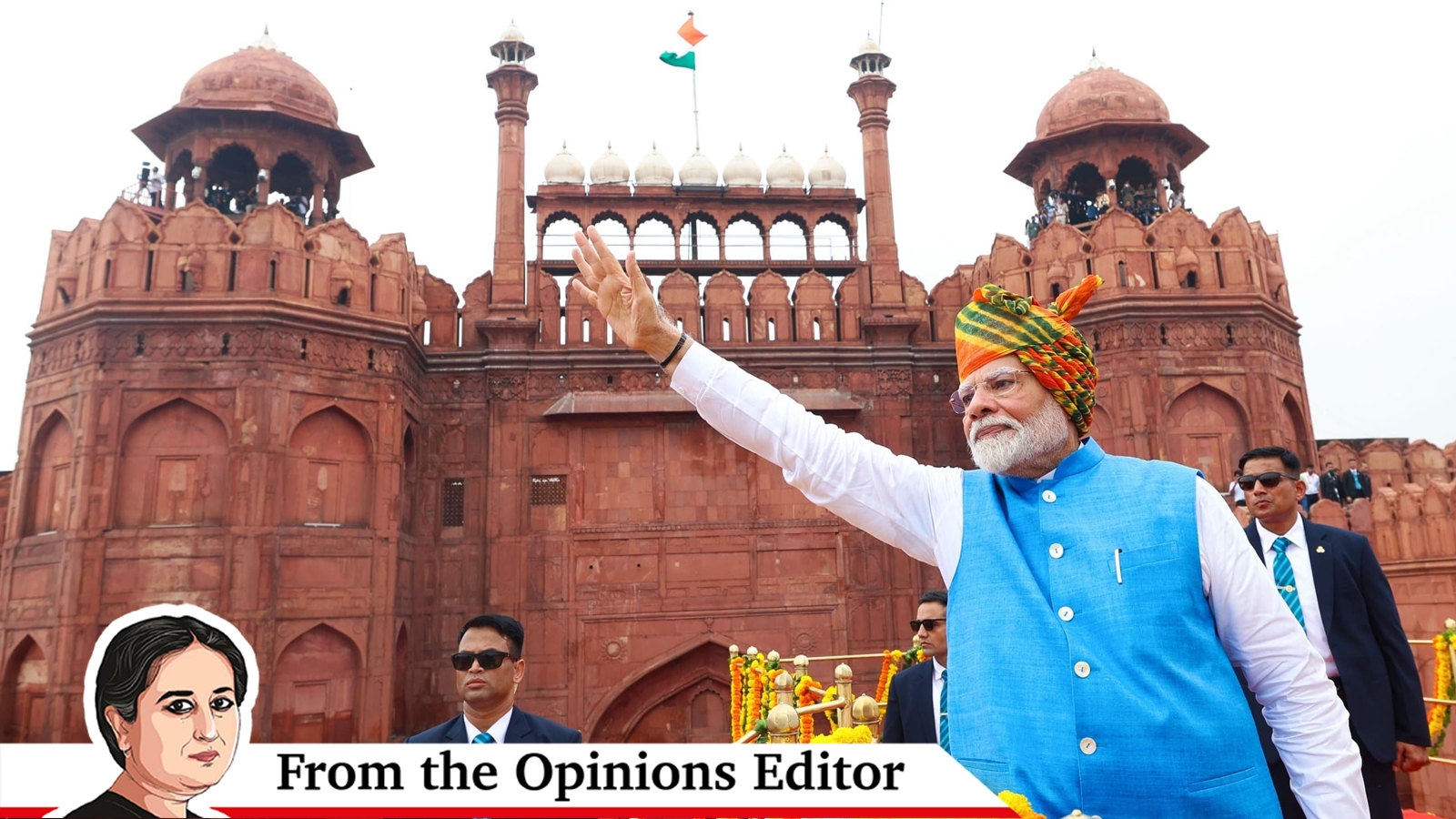There was a sameness to the frame, but as Prime Minister Narendra Modi spoke from the ramparts of Red Fort, he sounded somewhat different. Listening to his 11th consecutive I-Day speech, it was possible to spot an absence: There was no striking new coinage.
In 2014, the newly elected PM who had come riding a clamour for change from a Congress dispensation surrounded by allegations of corruption, and a long-simmering Hindu assertion risen to the surface, had announced that he was not going to play by the old formalities and rules so far — his I-Day speech seemed to carry that message.
The new prime minister said two things that stood out in his first I-Day speech on August 15. He spoke on the issue of swachhta, or sanitation, urging MPs to use their constituency development funds to build toilets in homes and schools, and separate toilets for girls in schools: ”In one year we should be able to build toilets so that on Independence Day next year, we can proudly say all the schools in the country have toilets”.
And, less than two years after the gruesome rape and assault of a young woman in a bus in Delhi had become a crime story that struck a chord across the nation, he spoke of the need for families to hold their sons accountable rather than impose more restrictions on their daughters. Every parent asks their daughter where she is going, when she will be back home. “But do these parents ask their sons where they are going?” he asked. Because those who rape are someone’s sons, he said.
At that time, the PM used the grandeur of the occasion and the imposing locale to reach inside homes to talk to people about the need for cleanliness and about raising their sons better. It seemed to be a marker of the just-begun prime ministership — the ability to speak many languages, to make small moments large, and the ambition to speak to the people directly, dispensing with mediators and mediating institutions.
There was no comparable moment of outreach in PM Modi’s 11th I-Day speech at the Red Fort. It could be that 10 years later, after an election verdict that has stripped his party of a majority and made him dependent on allies, he has lost some of the confidence in his own ability to pierce the abstraction and strike an intimate chord — that confidence had, even in the last I-Day address in 2023, made him address the nation as “mere parivarjano (my family members)” instead of the more conventional “mere deshvasiyon (my countrymen)” or the stereotypical “bhaiyon aur behenon (brothers and sisters)”.
Or it could be that 10 years on, despite the self-congratulation, he knows that on the ground, on both sanitation and crimes against women, for instance — the two issues he once framed in a different language from the Red Fort — there are no clean slates and large areas of changelessness.
Vinesh Phogat has just returned from Paris, her photographs in today’s newspapers show a wan face, trauma still writ large. It was not just the 100g of excess weight that finally kept her from the winner’s podium, it is, also, the arduous odds she had to fight against in her own country in the run-up to the Olympics. Her ordeal had started after she took on Brij Bhushan Sharan Singh, six-term MP, five times on the BJP ticket, accused of sexual harassment by some of the country’s most decorated women wrestlers.
As Phogat fought the ruling establishment in the Wrestling Federation, the Modi-led government mostly remained a mute and unmoved spectator — it took the court’s intervention and direction even to file an FIR, the task of breaking the standstill was passed by an abdicating government to the court.
On swachhta or sanitation, to see the distance not travelled, go to any small town in UP or Bihar, and see how garbage and poor drainage in particular still discolour and sully public spaces. The signboards and slogans of the Swachhta Abhiyan are an unintended reproach. They point to the unfinished task, its dismal obstinacies and difficulties, not to any accomplishment.
This I-Day, then, PM Modi did not have either the heady mandate, or the benefit of doubt, that he had in 2014 and his speech reflected that. It had no breakout moments, and it stayed within the well-worn Modi territory of framing broad-brush aspirations — “Viksit Bharat at 2047” — and painting an enemy within — those who have “vikrit mansikta (perverted mentality)” and who are naysayers or “nirashavadi”.
Even when he spoke of a big and controversial move — the Uniform Civil Code needs to be implemented, he said — he did it with an uncharacteristically constrained style.
The UCC is a “core” issue for the BJP, and the only one of the three — the Ram temple and Article 370 being the other two — that remains unfulfilled. It has rightly raised apprehensions, especially in the minorities, of the BJP’s intent to impose uniformity, flatten out India’s diversities.
A UCC must be brought in, the PM said, which is “secular” not “communal”, after a discussion that must be joined by the people, and because the Constitution mentions it and the Court has said it is a desirable goal.
The fact that he called it “secular” — so far, for the BJP, secular has been a term of abuse — and that he called for a larger debate and sought the shield of Court and Constitution, makes this big strike different from his other moves that have revelled in shock-and-awe, secrecy and the attempt to take by surprise.
Till next week,
Vandita



